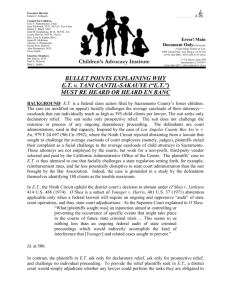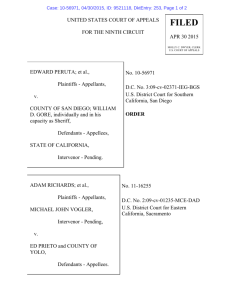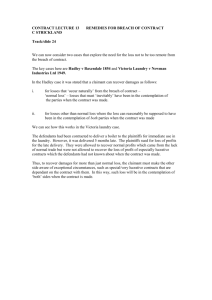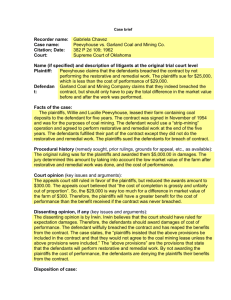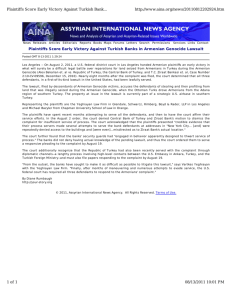Christopher H. Knauf, State Bar No. 185180 KNAUF ASSOCIATES
advertisement
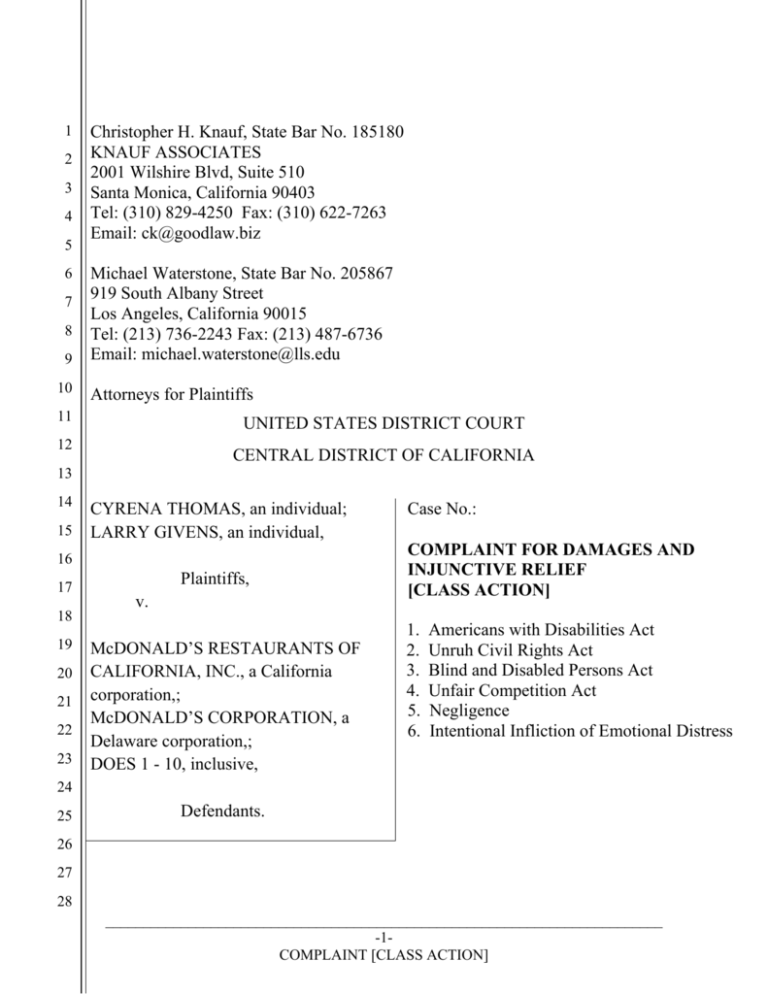
1 2 3 4 5 6 7 8 9 10 Christopher H. Knauf, State Bar No. 185180 KNAUF ASSOCIATES 2001 Wilshire Blvd, Suite 510 Santa Monica, California 90403 Tel: (310) 829-4250 Fax: (310) 622-7263 Email: ck@goodlaw.biz Michael Waterstone, State Bar No. 205867 919 South Albany Street Los Angeles, California 90015 Tel: (213) 736-2243 Fax: (213) 487-6736 Email: michael.waterstone@lls.edu Attorneys for Plaintiffs 11 UNITED STATES DISTRICT COURT 12 CENTRAL DISTRICT OF CALIFORNIA 13 14 15 CYRENA THOMAS, an individual; LARRY GIVENS, an individual, 16 17 18 19 20 21 22 23 Plaintiffs, v. McDONALD’S RESTAURANTS OF CALIFORNIA, INC., a California corporation,; McDONALD’S CORPORATION, a Delaware corporation,; DOES 1 - 10, inclusive, Case No.: COMPLAINT FOR DAMAGES AND INJUNCTIVE RELIEF [CLASS ACTION] 1. 2. 3. 4. 5. 6. Americans with Disabilities Act Unruh Civil Rights Act Blind and Disabled Persons Act Unfair Competition Act Negligence Intentional Infliction of Emotional Distress 24 25 Defendants. 26 27 28 __________________________________________________________________________ -1COMPLAINT [CLASS ACTION] 1 INTRODUCTION 2 Plaintiffs Cyrena Thomas and Larry Givens, on their own behalf and on 3 behalf of all similarly situated persons, hereby allege the following facts and 4 submit the following claims for relief against Defendants McDonald’s Restaurants 5 of California, Inc. and its corporate parent, McDonald’s Corporation: 6 1. Plaintiffs bring this class action complaint for declaratory and 7 injunctive relief on behalf of all persons with disabilities who use service animals 8 and who have been denied full and equal access to McDonald’s fast food 9 restaurants, or have otherwise experienced unlawful discrimination by the 10 11 Defendants, due to the plaintiff class’ use of service animals. 2. Plaintiffs bring their claims against Defendants for their violations of 12 Title III of the Americans with Disabilities Act (42 U.S.C. § 12181 et seq.), the 13 Unruh Civil Rights Act (Cal. Civil Code § 51 et seq.), the Blind and Disabled 14 Persons Act (Cal. Civil Code § 54 et seq.), the Unfair Competition Act (Cal. Bus. 15 & Prof. Code § 17200 et seq.), and common law negligence, negligence per se, 16 and intentional infliction of emotional distress. 17 3. Plaintiffs seek statutory damages for the named plaintiffs only, and 18 seek preliminary and permanent declaratory and injunctive relief prohibiting 19 Defendants from unlawfully discriminating against people with disabilities using 20 service animals in Defendants’ restaurants, and requiring Defendants to review 21 and modify their written policies, procedures, and employee training regarding 22 their employees’ treatment of customers using service animals. JURISDICTION AND VENUE 23 24 4. As this action arises in part under the Americans with Disabilities Act, 25 this Court has jurisdiction over Plaintiffs’ claims pursuant to 28 U.S.C. §§ 1331 26 and 1343. This Court has supplemental jurisdiction over Plaintiffs’ state law 27 claims pursuant to 28 U.S.C. § 1367(a), and has jurisdiction over the claims for 28 __________________________________________________________________________ -2COMPLAINT [CLASS ACTION] 1 2 3 declaratory relief pursuant to 28 U.S.C. §§ 2201 and 2202. 5. § 1391(b), as the events involving Plaintiffs occurred in this judicial district. PARTIES 4 5 Venue is proper in the Central District of California under 28 U.S.C. 6. Plaintiff Cyrena Thomas has the disability of blindness and uses a 6 trained and licensed service animal (guide dog) named Suzie Q. At all relevant 7 times, Ms. Thomas has been a person with a disability within the meaning of the 8 Americans with Disabilities Act and California Government Code section 12926. 9 Ms. Thomas brings this action on her own behalf and on behalf of all persons with 10 11 disabilities in California and the United States who use service animals. 7. Plaintiff Larry Givens is the fiancée of Ms. Thomas. By virtue of his 12 association with Ms. Thomas, he was subjected to unlawful discrimination during 13 the incident at issue. During the incident, Mr. Givens had a “known association” 14 with Ms. Thomas within the meaning of the Americans with Disabilities Act. Mr. 15 Givens brings this action in his individual capacity only. 16 8. Defendant McDonald’s Restaurants of California Inc. (hereinafter 17 “McDonald’s California”) at all relevant times has been a California corporation 18 and owns the McDonald’s restaurant where the events involving the named 19 plaintiffs arose. McDonald’s California also owns and operates a multitude of 20 other McDonald’s locations in California. McDonald’s California implements 21 corporate policies and procedures governing the operation of its restaurants, and 22 implements corporate training protocols for all employees. 23 9. Defendant McDonald’s Corp. (hereinafter “McDonald’s National”), a 24 Delaware corporation, is the parent corporation of McDonald’s California and an 25 owner of the restaurant where the events involving the named plaintiffs arose. 26 McDonald’s National owns thousands of McDonald’s restaurants throughout the 27 United States. McDonald’s National implements written policies and procedures 28 __________________________________________________________________________ -3COMPLAINT [CLASS ACTION] 1 governing the operation of all of its restaurants and implements training protocols 2 for all employees. 3 10. The identities of Defendants Does 1 through 10 are unknown at this 4 time. Plaintiffs will amend this Complaint when their identities become known. 5 11. At all relevant times, all Defendants and each of them, were acting in 6 concert with each other and were the agent, principal, subsidiary, representative, 7 alter ego, officer, employer, employee, manager, director, shareholder, partner, 8 co-conspirator, aider and abettor, and fiduciary in proximately causing the injuries 9 and damages alleged herein. 10 12. At all relevant times, all Defendants and each of them were legally 11 responsible to Plaintiffs for each of their co-defendants’ wrongs, acts, and 12 omissions alleged herein as though they had each committed each act themselves, 13 and at all times authorized, directed, and ratified the acts and omissions of each 14 remaining defendant. 15 16 FACTS COMMON TO ALL CLAIMS FOR RELIEF 13. On March 1, 2010, Ms. Thomas and Mr. Givens attempted to enjoy a 17 meal together at the McDonald’s restaurant located at 3501 La Cienega Boulevard 18 in Los Angeles, California. At all relevant times, the restaurant has been owned 19 and operated by Defendants. 20 14. At all relevant times, Ms. Thomas and Mr. Givens were accompanied 21 by their infant son and Ms. Thomas’ service dog, Suzie Q. Ms. Thomas relies on 22 Suzie Q to be able to live independently and, therefore, keeps Suzie Q with her, 23 and is assisted by her, at all times when in public. 24 15. Upon entering the McDonald’s restaurant on the date in question, one 25 or more employees requested that Plaintiffs remove their dog from the premises. 26 Plaintiffs informed Defendants’ employees that Suzie Q was a service animal. 27 Defendants’ employees nevertheless instructed Plaintiffs to remove the dog and 28 __________________________________________________________________________ -4COMPLAINT [CLASS ACTION] 1 threatened to not serve them unless they did so. Ms. Thomas became upset and 2 ultimately exited the restaurant with Suzie Q. 3 16. Mr. Givens remained in the restaurant and attempted to educate 4 Defendants’ employees regarding the rights of people with service animals. He 5 explained that their actions violated the law and that he and Ms. Thomas had the 6 right to dine with the service animal present. Defendants nevertheless continued 7 to refuse to serve Plaintiffs unless Suzie Q remained outside the restaurant. 8 9 10 11 17. As a result of Defendants’ employees’ actions, Plaintiffs left Defendants’ restaurant and ate their meal at another restaurant nearby, with Suzie Q, and without any difficulty. 18. The incident at Defendants’ restaurant was upsetting, frustrating, 12 shocking, and humiliating to Plaintiffs. Defendants’ employees’ actions caused 13 Ms. Thomas and Mr. Givens to feel like second-class citizens. 14 19. As McDonald’s restaurants are popular and ubiquitous, Plaintiffs 15 desire to return if they can be assured that employees are properly trained 16 regarding the treatment of customers with service animals. Plaintiffs are fearful 17 and deterred when considering McDonald’s as a dining option. 18 20. Over the past several years, similar incidents in which Defendants’ 19 employees refuse service to customers with disabilities using service animals have 20 been reported in the media throughout the United States. 21 21. Plaintiffs are informed, believe, and based thereon allege that their 22 individual experiences of disability discrimination by Defendants, along with 23 other reported similar accounts, are representative of Defendants’ overall failure 24 to maintain adequate written policies and procedures and adequate training of 25 employees as to the rights of customers with disabilities using service animals. 26 27 28 __________________________________________________________________________ -5COMPLAINT [CLASS ACTION] CLASS ACTION ALLEGATIONS 1 2 3 4 22. Plaintiffs re-allege and incorporate by reference all previous paragraphs. 23. Plaintiffs bring this class action under Rule 23(b)(2) of the Federal 5 Rules of Civil Procedure, as Defendants have acted and refused to act on grounds 6 that apply generally to the class, so that final injunctive relief and corresponding 7 declaratory relief are appropriate respecting the class as a whole. 8 9 10 24. Plaintiffs bring this action individually and on behalf of all persons with disabilities residing in California and the United States who use service animals. 11 25. Plaintiffs are informed, believe, and based thereon allege that 12 Defendants do not have adequate policies or procedures in place concerning the 13 rights of people with disabilities who bring service animals into Defendants’ 14 restaurants. 15 26. Defendants have acted or refused to act on grounds that apply 16 generally to the class, so that final injunctive relief or corresponding declaratory 17 relief is appropriate respecting the class as a whole. 18 27. Based on state and national data, Plaintiffs are informed, believe, and 19 based thereon allege that the putative class consists of thousands of individuals 20 with disabilities. 21 28. Each member of the putative class has at all relevant times been a 22 “qualified individual with a disability” within the meaning of the ADA and 23 California law. 24 29. Given the popularity and ubiquity of Defendants’ restaurants, it is 25 reasonably foreseeable that many, if not most, members of the class will attempt 26 to bring their service animal to one or more of Defendants’ restaurants. 27 30. The violations of the ADA and California law set forth herein, if not 28 __________________________________________________________________________ -6COMPLAINT [CLASS ACTION] 1 enjoined by this Court, will continue to affect members of the class and cause 2 them to experience unnecessary exclusion, segregation, and emotional harm. 31. The legal requirements are met with regard to the proposed class in 3 4 5 that: a. all class members before the Court; 6 7 b. c. The named plaintiffs’ claims are typical of the claims of the class; 10 11 There are questions of law and fact that are common to the class; 8 9 The class is so numerous that it would be impractical to bring d. The named plaintiffs will fairly and adequately represent all 12 members of the class. Their attorneys specialize in the field of 13 disability rights and are experienced in bringing Rule 23(b)(2) 14 class actions; and 15 e. applicable to the class. 16 17 18 19 Defendants have acted or refused to act on grounds generally 32. The common questions of law and fact, shared by the named plaintiffs and all class members, include: a. Whether the putative class members are all individuals with 20 disabilities using service animals within the meaning of the 21 ADA and California law; 22 b. Whether Defendants have excluded and continue to exclude 23 certain members of the putative class from their restaurants due 24 to the use of a service animal; 25 c. Whether Defendants have and continue to violate Title III of the 26 ADA, the Unruh Act, Blind and Disabled Persons Act, and 27 Unfair Competition Act; and 28 __________________________________________________________________________ -7COMPLAINT [CLASS ACTION] d. 1 Whether Defendants have and continue to breach a duty of due 2 care, in addition to their statutory duties, to the putative class 3 and thereby actually and foreseeably cause them emotional 4 harm. 5 6 7 8 9 10 FIRST CLAIM FOR RELIEF TITLE III OF THE AMERICANS WITH DISABILITIES ACT 42 U.S.C. § 12181 et seq. By Plaintiffs Individually And On Behalf Of The Putative Class Against All Defendants 33. Plaintiffs re-allege and incorporate by reference all previous paragraphs. 11 34. Congress enacted the Americans with Disabilities Act upon finding, 12 among other things, that “society has tended to isolate and segregate individuals 13 with disabilities” and that such forms of discrimination continue to be a “serious 14 and pervasive social problem.” 42 U.S.C. §12101(a)(2). 15 35. In response to these findings, Congress explicitly stated that the 16 purpose of the ADA is to provide “a clear and comprehensive national mandate 17 for the elimination of discrimination against individuals with disabilities” and 18 “clear, strong, consistent, enforceable standards addressing discrimination against 19 individuals with disabilities.” 42 U.S.C. §12101(b)(1)-(2). 20 36. Title III of the ADA provides in pertinent part: “No individual shall 21 be discriminated against on the basis of disability in the full and equal enjoyment 22 of the goods, services, facilities, privileges, advantages, or accommodations of 23 any place of public accommodation by any person who owns . . . or operates a 24 place of public accommodation.” 42 U.S.C. §12182(a). 25 37. The ADA further provides that "it shall be discriminatory to afford an 26 individual or class of individuals, on the basis of a disability or disabilities of such 27 individual or class, directly, or through contractual, licensing, or other 28 __________________________________________________________________________ -8COMPLAINT [CLASS ACTION] 1 arrangements with the opportunity to participate in or benefit from a good, 2 service, facility, privilege, advantage, or accommodation that is not equal to that 3 afforded to other individuals." 42 U.S.C. § 12182(b)(1)(A)(ii). 4 38. Discrimination under the ADA includes "a failure to take such steps 5 as may be necessary to ensure that no individual with a disability is excluded, 6 denied services, segregated or otherwise treated differently than other individuals 7 because of the absence of auxiliary aids and services . . .” 42 U.S.C. § 8 12182(b)(2)(A)(iii). 9 39. The ADA further prohibits “a failure to make reasonable modification 10 in policies, practices, or procedures, when such modifications are necessary to 11 afford such goods, services, facilities, privileged, advantages, or accommodations 12 to individuals with disabilities…” 42 U.S.C. § 12182(b)(2)(A)(ii). 13 40. The federal regulations implementing Title III of the ADA provide: 14 “Generally, a public accommodation shall modify policies, practices, or 15 procedures to permit the use of a service animal by an individual with a disability. 16 28 C.F.R. § 36.302 (1999). 17 41. The ADA also prohibits exclusion and denial of equal goods, services, 18 facilities, and privileges to persons because of the known disability of an 19 individual with whom they are known to have a relationship or association. 42 20 U.S.C. § 12182(b)(1)(E). 21 22 23 24 25 26 27 42. At all relevant times, Ms. Thomas has been an individual with a disability within the meaning of the ADA. 43. At all relevant times, Ms. Thomas’ guide dog, Suzie Q, has been a service animal within the meaning of the ADA. 44. At all relevant times, Defendants’ employees were aware that Mr. Givens had an association or relationship with Ms. Thomas. 45. Defendants each own and operate restaurants constituting “places of 28 __________________________________________________________________________ -9COMPLAINT [CLASS ACTION] 1 public accommodation” within the meaning of the ADA, including the restaurant 2 where Plaintiffs’ incident occurred. 3 46. By virtue of their acts and omissions herein alleged, Defendants have 4 violated Title III of the ADA as to Plaintiffs individually and as to members of the 5 putative class. 6 47. Pursuant to 42 U.S.C. § 12188(a), Plaintiffs are entitled to declaratory 7 and injunctive relief, and to recover reasonable attorneys’ fees and costs incurred 8 in bringing this action. 9 10 11 12 13 14 SECOND CLAIM FOR RELIEF UNRUH CIVIL RIGHTS ACT California Civil Code § 51 et seq. By Plaintiffs Individually And On Behalf Of The Putative Class Against All Defendants 48. Plaintiffs re-allege and incorporate by reference all previous paragraphs. 15 49. California’s Unruh Civil Rights Act provides: 16 “All persons within the jurisdiction of this state are free and equal, and no 17 matter what their . . . disability [or] medical condition, are entitled to the full and 18 equal accommodations, advantages, facilities, privileges, or services in all 19 business establishments of every kind whatsoever.” Cal. Civ. Code § 51(b). 20 50. The Unruh Act provides that violations of the Americans with 21 Disabilities Act also constitute violations of the Unruh Act. Cal. Civ. Code § 22 51(f). As such, Plaintiffs’ first claim for relief is expressly incorporated as a 23 violation of the Unruh Act. 24 25 26 27 51. Ms. Thomas is a person with a disability within the meaning of the Unruh Act. 52. Defendants’ restaurants are business establishments within the meaning of the Unruh Act. 28 __________________________________________________________________________ -10COMPLAINT [CLASS ACTION] 1 2 53. By virtue of the acts and omissions alleged herein, Defendants have violated and continue to violate the Unruh Act. 3 54. Plaintiffs are entitled to declaratory and injunctive relief on behalf of 4 themselves and the putative class, as well as reasonable attorneys’ fees and costs. 5 Cal. Civ. Code § 52(a). 6 55. As to the named plaintiffs, Defendants are liable up to a maximum of 7 three times the amount of Plaintiffs’ actual damages, including emotional distress 8 damages determined by the jury, and in no case less than $4,000 per violation. 9 Cal. Civ. Code § 52(a). 10 11 12 13 14 15 16 THIRD CLAIM FOR RELIEF BLIND AND DISABLED PERSONS ACT California Civil Code § 54 et seq. By Plaintiffs Individually And On Behalf Of The Putative Class Against All Defendants 56. Plaintiffs re-allege and incorporate by reference all previous paragraphs. 57. The Blind and Disabled Persons Act (“Disabled Persons Act”) 17 provides that people with disabilities shall have “full and equal use” of public 18 facilities and other public places, and have the same right as the general public to 19 the full and free use of, inter alia, public buildings, public facilities, and other 20 public places. Cal. Civ. Code § 54(a). 21 58. The Disabled Persons Act further provides: 22 “Individuals with disabilities shall be entitled to full and equal access, as 23 other members of the general public, to accommodations, advantages, facilities, . . 24 . , and privileges of all . . . places of public accommodation, amusement, or resort, 25 and other places to which the general public is invited, subject only to the 26 conditions and limitations established by law, or state or federal regulation, and 27 applicable alike to all persons. 28 __________________________________________________________________________ -11COMPLAINT [CLASS ACTION] 1 Cal. Civ. Code § 54.1(a)(1). 2 59. California Civil Code section 54.2(a) provides: 3 “Every individual with a disability has the right to be accompanied by a 4 guide dog, signal dog, or service dog, especially trained for the purpose, in any of 5 the places specified in Section 54.1 without being required to pay an extra charge 6 or security deposit for the guide dog, signal dog, or service dog.” 7 60. Like the Unruh Act, the Disabled Persons Act also incorporates 8 violations of the Americans with Disabilities Act. Cal. Civ. Code § 54(c). As 9 such, Plaintiffs’ first claim for relief is expressly incorporated as a violation of the 10 11 12 13 14 15 16 17 Disabled Persons Act. 61. Ms. Thomas is a person with a disability within the meaning of the Disabled Persons Act. 62. At all relevant time, Suzie Q was a guide dog and/or service dog within the meaning of the Disabled Persons Act. 63. Defendants’ restaurants are public facilities and public places within the meaning of the Disabled Persons Act. 64. By virtue of the acts and omissions alleged herein, Defendants denied, 18 interfered with admittance to, and interfered with Plaintiffs’ enjoyment of their 19 restaurants, and otherwise interfered with the rights of Ms. Thomas and other 20 members of the putative class, all of whom are individuals with a disability under 21 California Civil Code sections 54, 54.1 and 54.2. 22 65. “Interfere” as used herein, includes, but is not limited to, preventing or 23 causing the prevention of a guide dog, signal dog, or service dog from carrying 24 out its functions in assisting a person with a disability. 25 26 27 66. By virtue of the acts and omissions alleged herein, Defendants have violated and continue to violate the Disabled Persons Act. 67. Plaintiffs are entitled to declaratory relief on behalf of themselves and 28 __________________________________________________________________________ -12COMPLAINT [CLASS ACTION] 1 the putative class, as well as reasonable attorneys’ fees and costs. Cal. Civ. Code § 2 54.3. 3 68. As to the named plaintiffs, Defendants are liable up to a maximum of 4 three times the amount of Plaintiffs’ actual damages, including emotional distress 5 damages determined by the jury, and in no case less than $1,000 per violation. 6 Cal. Civ. Code § 54.3(a). 7 FOURTH CLAIM FOR RELIEF UNFAIR COMPETITION ACT California Business & Professions Code § 17200 et seq. By Plaintiffs Individually And On Behalf Of The Putative Class And General Public, Against All Defendants 8 9 10 11 12 69. Plaintiffs re-allege and incorporate by reference all previous paragraphs. 13 70. Plaintiffs bring their claims in their individual capacities, on behalf of 14 the putative class, and as provided in the Unfair Competition Act, on behalf of the 15 general public. 16 71. By engaging in the conduct described herein, Defendants have 17 committed acts of unlawful and unfair business practices within the meaning of 18 the Unfair Competition Act. 19 72. The unlawful and unfair business practices conducted by Defendants 20 are ongoing and present a threat and likelihood of continuing discrimination 21 against Plaintiffs and other members of the general public who may visit 22 Defendants’ restaurants. Accordingly, Plaintiffs seek injunctive and declaratory 23 relief. 24 73. Pursuant to California Code of Civil Procedure § 1021.5, Plaintiffs are 25 entitled to recover from Defendants their reasonable attorneys’ fees and costs 26 incurred in bringing this action. 27 28 __________________________________________________________________________ -13COMPLAINT [CLASS ACTION] 1 2 3 4 5 6 7 8 9 10 FIFTH CLAIM FOR RELIEF NEGLIGENCE AND NEGLIGENCE PER SE By Plaintiffs Individually And On Behalf Of The Putative Class Against All Defendants 74. Plaintiffs re-allege and incorporate by reference all previous paragraphs. 75. At all relevant times, Defendants owed a duty of due care to Plaintiffs and the putative class. 76. Defendants breached their duty of due care to Plaintiffs and the putative class by the acts and omissions alleged herein. 77. By their acts and omissions as alleged herein, Defendants violated 11 state and federal statutes and regulations, including but not limited to the ADA, 12 the Unruh Act, and the Disabled Persons Act. 13 78. Defendants’ breach of duty and violations of law proximately caused, 14 and were a substantial factor in causing, Plaintiffs’ damages as alleged herein. 15 Such damages were reasonably foreseeable to Defendants. 16 17 18 19 20 79. Plaintiffs’ damages resulted from an occurrence the nature of which the violated statutes and regulations were designed to prevent. 80. At all relevant times, Plaintiffs have belonged to the class of persons for whose protection the statutes and regulations were adopted. 81. By virtue of Defendants’ acts and omissions as alleged herein, 21 Plaintiffs and the putative class are entitled to preliminary and permanent 22 injunctive relief. 23 82. The named plaintiffs are entitled to an award of damages, including 24 exemplary damages, in an amount according to proof, as a result of Defendants’ 25 conduct alleged herein. 26 27 28 __________________________________________________________________________ -14COMPLAINT [CLASS ACTION] SIXTH CLAIM FOR RELIEF INTENTIONAL INFLICTION OF EMOTIONAL DISTRESS By Plaintiffs Individually And On Behalf Of The Putative Class Against All Defendants 1 2 3 4 5 6 83. Plaintiffs re-allege and incorporate by reference all previous paragraphs. 84. Plaintiffs bring their claims in their individual capacities, on behalf of 7 the putative class, and, as provided in the Unfair Competition Act, on behalf of the 8 general public. 9 10 11 12 13 14 15 85. Defendants’ acts and omissions as alleged herein constitute extreme and outrageous conduct having no place in civil society. 86. Defendants’ acts and omissions alleged herein intentionally caused or recklessly disregarded the probability of causing severe emotional distress. 87. Defendants’ acts and omissions alleged herein actually and proximately caused Plaintiffs’ emotional distress. 88. By virtue of Defendants’ acts and omissions as alleged herein, 16 Plaintiffs and the putative class are entitled to preliminary and permanent 17 injunctive relief. 18 89. The named plaintiffs are entitled to an award of damages, including 19 exemplary damages, in an amount according to proof, as a result of Defendants’ 20 conduct alleged herein. PRAYER FOR RELIEF 21 22 23 24 Plaintiffs hereby pray for judgment against Defendants according to proof on all causes of action, as follows: 1. For the putative class (and for the general public pursuant to the 25 Unfair Competition Act), Plaintiffs seek the following: 26 a. A declaration that Defendants’ conduct as alleged herein violated 27 the Americans with Disabilities Act, Unruh Civil Rights Act, 28 Disabled Persons Act, and the Unfair Competition Act; __________________________________________________________________________ -15COMPLAINT [CLASS ACTION] b. For appropriate preliminary and permanent injunctive relief 1 2 pursuant to the Americans with Disabilities Act, Unruh Civil 3 Rights Act, and the Unfair Competition Act only; 4 2. a. Treble actual damages, pursuant to Cal. Civ. Code §§ 52.1 and 5 54.3; 6 b. Exemplary damages, pursuant to California Civil Code § 3294; 7 8 3. Attorneys’ fees and costs of suit, pursuant to 42 U.S.C. § 12188, California Civil Code §§ 52.1 and 54.3, and California Code of Civil 9 Procedure § 1021.5. 10 11 For the named plaintiffs: 4. For other just and proper relief as the Court may order. 12 13 Dated: February 29, 2012 KNAUF ASSOCIATES 14 __________________________ By: Christopher H. Knauf Attorneys for Plaintiffs 15 16 17 18 19 DEMAND FOR JURY TRIAL Plaintiffs hereby request a jury trial. 20 21 22 23 24 25 Dated: February 29, 2012 KNAUF ASSOCIATES ___________________________ Christopher H. Knauf Attorneys for Plaintiffs 26 27 28 __________________________________________________________________________ -16COMPLAINT [CLASS ACTION]
![[Click and Enter Attorney Name], State Bar No - E](http://s3.studylib.net/store/data/007177564_1-4d9407aff5e1ecb2a5922cd955484ee2-300x300.png)
